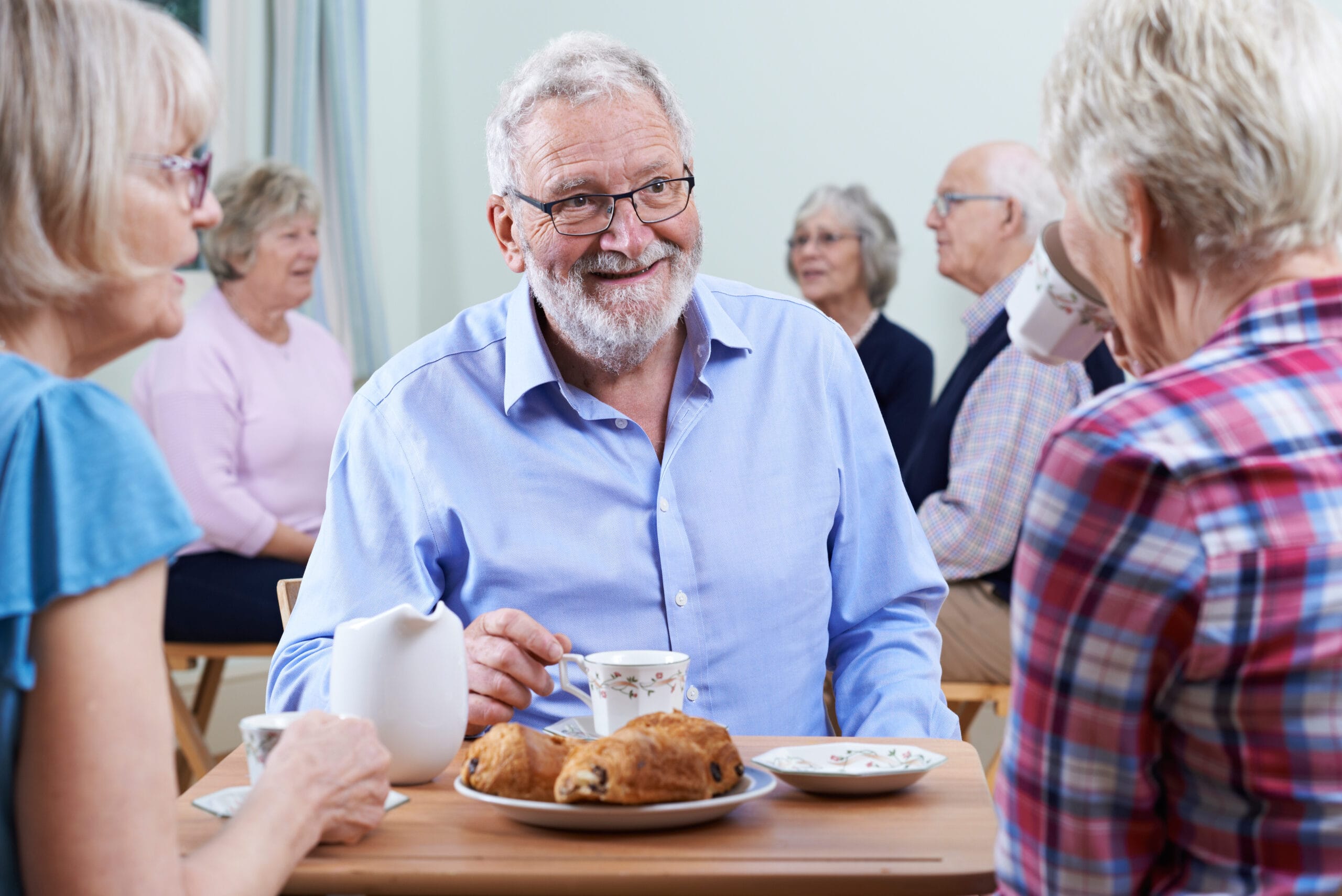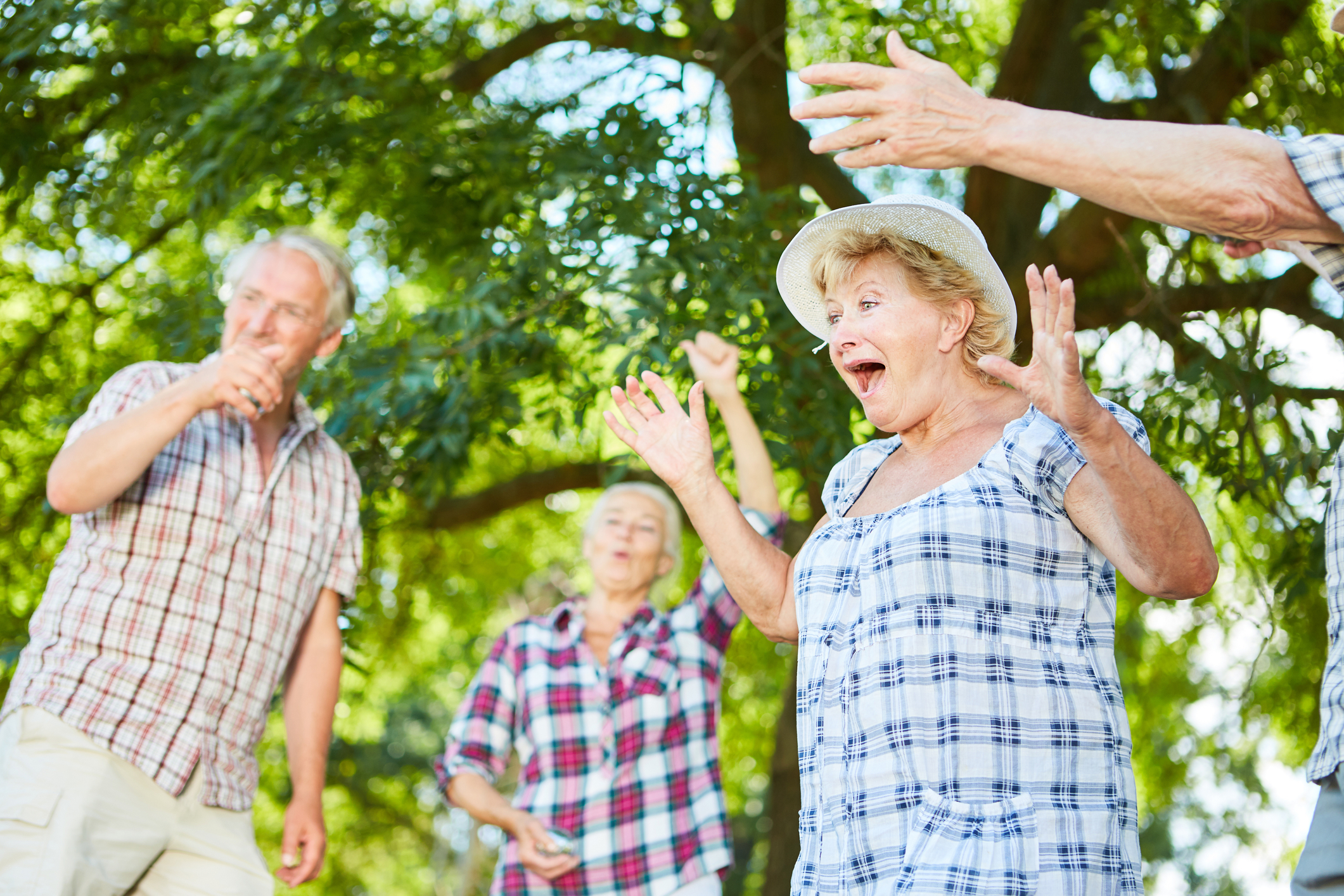Benefits of Senior Socialization (and How to Make Friends While Aging)

Making social connections is one of the greatest joys in life, and our innate desire for a vibrant social life remains no matter our age. For older adults, however, staying connected to others can be hard, increasing their risk of social isolation. According to the Centers for Disease Control and Prevention (CDC), roughly 25% of U.S. Americans aged 65 or older are isolated socially, making senior isolation a major public health concern. The solution to this issue is, of course, senior socialization.
While making friends and meeting new people is easier said than done, it is possible for older people to expand their social connections and foster meaningful relationships with others. Here is why fostering connections among older people is beneficial, as well as actionable insights on how to do just that.
6 Major Benefits of Social Interaction While Aging
The importance of socialization cannot be overstated. Social interaction is necessary for not just our mental health, but also our physical health. Specific mental and physical health benefits of socialization for older adults include:
- Reduced risk of dementia. Isolation can increase the risk of Alzheimer's disease and other forms of dementia, while social engagement can conversely decrease this risk.
- Improved self-esteem. People who feel that they belong to a community develop a sense of purpose and sense of belonging that can boost self-esteem.
- Reduced risk of mental illness. Staying connected keeps the mind healthy. Socially withdrawn people, including older people, are at heightened risk for mental health issues like depression and anxiety.
- Reduced risk of heart disease. Fostering connections with other people can improve heart health, while loneliness can alternatively harm the cardiovascular system. For instance, one study found "that both social isolation and loneliness increased the risk of hospitalization or death from heart failure by 15% to 20%," and other experts claim that poor socialization and loneliness can result in "a 29% increased risk for heart attack."
- Lower blood pressure. Many studies suggest that loneliness increases blood pressure, with age exacerbating the issue. Conversely, other studies associate stronger social support and social connections with lowered risk of hypertension (high blood pressure).
- Lower risk of overall mortality. Many studies show that stronger social connections decrease the overall odds of death, while feelings of loneliness and lack of belonging tend to increase overall risk of death, no matter the cause.
What Causes Social Isolation in the Elderly?
In order to create social opportunities for seniors, it's important to understand why older adults are at higher risk of social isolation and feelings of loneliness in the first place. According to a study from Murdoch University's Centre for Social and Community Research, reasons for senior isolation include:
- Shrinking social circles. Older people's social circles tend to shrink as family members or close friends move or pass away, or the older person retires and no longer has extended regular contact with work colleagues. While everyone's social circles change over time, older people may have a more difficult time making new friends than younger age groups.
- Age-related health obstacles to social contact. Older people are less likely to engage in social activities due to aging-related issues, including mobility issues that make it harder to walk or engage in other forms of physical activity with others, vision issues that impair the ability to drive, hearing issues that make it harder to engage in active conversations, and cognitive decline, which can increase the risk of social withdrawal.
- Lack of transportation. Many rural and suburban areas (and even some urban areas) are heavily reliant on cars, meaning older people who cannot drive due to financial reasons or safety concerns are often left functionally homebound, making it harder for these people to engage in community outings. This fact is especially true if they do not have any nearby loved ones who can give them rides.
- Limited budgets. Many social activities, like getting lunch with a friend, cost money, which can be cost prohibitive for retirees on pensions and limited budgets, especially during times of inflation.
How to Build a Strong Social Network While Aging
Building and maintaining a social network can be hard, but it's absolutely worth it. It can lead to an improved sense of well-being and overall higher quality of life.
Below are some of the best methods for older adults—either yourself or an aging person in your life—to stay engaged and socially active.
- Make transportation accessible. If someone cannot drive due to vision impairment, see if the individual is willing to see an optometrist; the issue may be fixable, meaning the person can resume driving and be able to safely take themselves on outings. If the person can no longer safely drive, however, make sure other transportation services are possible. These services can include offering the person rides yourself, arranging ride-share services for the individual (e.g., Lyft or Uber), or connecting the person to senior-specific transportation services.
In the United States, Area Agencies on Aging are government-funded agencies that can connect older people with local transportation services. In St. Louis, Missouri, the local Area Agency in Agency offers free and discounted transportation services to eligible seniors to certain local events and necessary outings like grocery shopping or doctor visits.
- Make the first move. Sometimes older people may feel embarrassed that their social lives have quieted with age. Reduce their discomfort by making the first move. Be the one to visit them when possible. Make it a fun activity that they can participate in, like making a meal together. If physical visits are not possible, arrange for regular phone calls or even video chats.
- Get their hearing checked. Sometimes older people withdraw from social events because they're experiencing physical ailments that make it harder to socialize. Many older people, for example, suffer from some form of hearing loss, which can make it harder to actively participate in conversations. Helping your aging loved one get hearing aids could help them better engage with the world around them, reducing their sense of loneliness.
- Ensure they have mobility aids. Many older people experience issues getting from place to place on their own, which can make them cautious about entering public spaces. Ensuring the older people in your life have the right mobility aids, be it a walking stick, walker, mobility scooter, or wheelchair. Having access to these aids can make them feel more confident about moving around in places both around the home and out in public, making it easier to engage with other people on a regular basis.
- Know the signs of depression in older adults. Sometimes people socially withdraw due to mental illness. In these cases, professional mental health treatment can be the best course of action. Signs of depression in older people include loneliness, agitation, lethargy, sleep disturbances, and changes in weight.
Fostering Connections at St. Andrew's
St. Andrew's is all about fostering connections. Our senior living communities are just that—communities. They encourage social engagement between residents, their family members, and caregivers every single day. Each community does so through a wide offering of amenities and services, including:
- Make transportation accessible. If someone cannot drive due to vision impairment, see if the individual is willing to see an optometrist; the issue may be fixable, meaning the person can resume driving and be able to safely take themselves on outings. If the person can no longer safely drive, however, make sure other transportation services are possible. These services can include offering the person rides yourself, arranging ride-share services for the individual (e.g., Lyft or Uber), or connecting the person to senior-specific transportation services.
In the United States, Area Agencies on Aging are government-funded agencies that can connect older people with local transportation services. In St. Louis, Missouri, the local Area Agency in Agency offers free and discounted transportation services to eligible seniors to certain local events and necessary outings like grocery shopping or doctor visits.
- Make the first move. Sometimes older people may feel embarrassed that their social lives have quieted with age. Reduce their discomfort by making the first move. Be the one to visit them when possible. Make it a fun activity that they can participate in, like making a meal together. If physical visits are not possible, arrange for regular phone calls or even video chats.
- Get their hearing checked. Sometimes older people withdraw from social events because they're experiencing physical ailments that make it harder to socialize. Many older people, for example, suffer from some form of hearing loss, which can make it harder to actively participate in conversations. Helping your aging loved one get hearing aids could help them better engage with the world around them, reducing their sense of loneliness.
- Ensure they have mobility aids. Many older people experience issues getting from place to place on their own, which can make them cautious about entering public spaces. Ensuring the older people in your life have the right mobility aids, be it a walking stick, walker, mobility scooter, or wheelchair. Having access to these aids can make them feel more confident about moving around in places both around the home and out in public, making it easier to engage with other people on a regular basis.
- Know the signs of depression in older adults. Sometimes people socially withdraw due to mental illness. In these cases, professional mental health treatment can be the best course of action. Signs of depression in older people include loneliness, agitation, lethargy, sleep disturbances, and changes in weight.
Fostering Connections at St. Andrew's
St. Andrew's is all about fostering connections. Our senior living communities are just that—communities. They encourage social engagement between residents, their family members, and caregivers every single day. Each community does so through a wide offering of amenities and services, including:
Of course, if you or your loved one is not ready to downsize and make the move to a retirement community, in-home care may help. St. Andrew's & Bethesda Home Health is a Medicare-certified home health agency that offers in-home care services, including companion care, to St. Louis-area seniors and their families.
Disclaimers: This article is for informational purposes only. It cannot be used to diagnose, treat, cure, or prevent any disease or condition. Please direct any and all medical or other healthcare concerns to a licensed professional.







